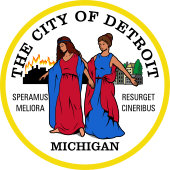Grand Boulevard (Detroit)
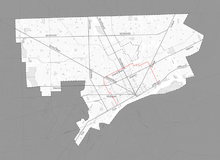 Grand Boulevard highlighted in red | |
| Maintained by | City of Detroit |
|---|---|
| West end | Jefferson Avenue, Detroit |
| Major junctions |
|
| East end | Riverbank Drive, Belle Isle |
Grand Boulevard is a thoroughfare in Detroit, Michigan, running east to west in some places and north to south in other places and is approximately 11 miles in length. It once constituted the city limits of Detroit. Grand Boulevard is named the "Berry Gordy, Jr. Boulevard" in the area where the Motown Historical Museum is located and the "General Motors Boulevard" in the area of Detroit's "New Center" where the Fisher Building and Cadillac Place (formerly the General Motors Building) are located. Grand Boulevard is commonly referred to by residents of the city simply as "the Boulevard".
History
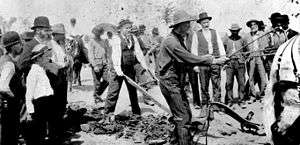
As early as 1876, Bela Hubbard and other Detroiters were cognizant of the efforts of Baron Georges-Eugène Haussmann to make Paris into a beautiful city by designing parks, broad streets, and grand boulevards. [1] [2] These citizens proposed adopting Haussmann's concepts by surrounding Detroit with its own "Grand Boulevard." When Belle Isle was transferred from the state to the city of Detroit, Michigan legislator James Randall included a rider calling for the construction of this Grand Boulevard.[1] However, the city government refused to begin work on the road right away, although a few people built homes along the Boulevard's proposed route.[1]
Finally, in 1891, Detroit mayor Hazen S. Pingree supported the idea and broke ground on the construction of Grand Boulevard, a ring road that wrapped around the city of Detroit.[3] The Boulevard ran for 12 miles (19 km), curving from the Detroit River on the west and returning to the river on the east, crossing Woodward Avenue at a point approximately 3 miles (4.8 km) north of the downtown area.[3] The Boulevard was originally thought to represent the absolute limit of the city's expansion, although tremendous growth at the beginning of the 20th century quickly pushed the city limits far beyond Grand Boulevard to its north, its east, and its west.[3]
By 1913, Grand Boulevard was completed, encircling the city.[4] It was generally recognized as a major attraction of the city; the entire length was decorated with trees, shrubbery, and flowerbeds.
During the 1980s, to accommodate construction of new facilities for the General Motors Corporation, portions of East Grand Boulevard were reconfigured. This was part of a controversial use of eminent domain by the City of Detroit which allowed for demolition of a substantial portion of the nearby Poletown neighborhood in order to make way for those new facilities. The controversy sparked racial divisions within Detroit. The Michigan Supreme Court, in the 1981 case of Poletown Neighborhood Council v. City of Detroit, settled the matter by ruling that the project did constitute a legitimate use of eminent domain authority and that the evictions could proceed.
Many years ago, the streetcar route which traveled upon Grand Boulevard was formally called the Grand Belt line because of Grand Boulevard's belt-like configuration around the most central part of Detroit. The subsequent bus route which traveled on some, but not all, of Grand Boulevard retained the "Grand Belt" name until a service cut in 2009 eliminated that public transit coverage entirely.
Landmarks
| Name | Image | Location | Summary | |
|---|---|---|---|---|
| 1 | Lee Plaza | 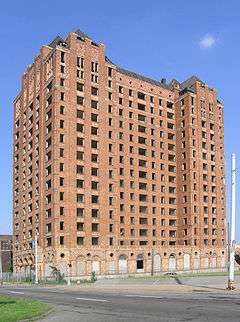 |
2240 W. Grand Blvd. 42°21′34″N 83°5′19″W / 42.35944°N 83.08861°W |
|
| 2 | Motown Record Corporation |  |
2648 W. Grand Blvd. 42°21′52″N 83°5′2″W / 42.36444°N 83.08389°W |
|
| 3 | Henry Ford Hospital |  |
2799 W. Grand Blvd. 42°22′0″N 83°5′2″W / 42.36667°N 83.08389°W |
|
| 4 | Fisher Building | 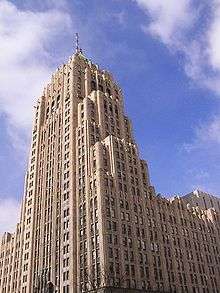 |
3011 West Grand Boulevard 42°22′8.5″N 83°4′36.92″W / 42.369028°N 83.0769222°W |
Built in 1927 by the Fisher brothers who owned Fisher Body of General Motors, this skyscraper is one of the greatest works by architect Albert Kahn. The Fishers spent lavishly to make this Art Deco masterpiece a monumental gift to Detroit and one of the most finely detailed major commercial buildings in the United States.[5] |
| 5 | Cadillac Place | 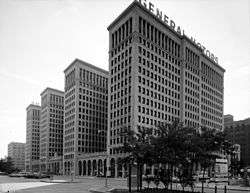 |
3044 W. Grand Blvd. 42°22′7″N 83°4′32″W / 42.36861°N 83.07556°W |
Known today as "Cadillac Place" and housing offices of Michigan state government, it was originally constructed as the General Motors Building. |
| 6 | East Grand Boulevard Historic District | 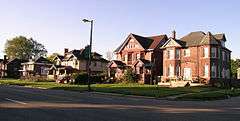 |
E. Grand Blvd., bet. E. Jefferson Ave. and Mack Ave. 42°21′12″N 83°0′22″W / 42.35333°N 83.00611°W |
|
| 7 | Saint Paul Manor Apartments | 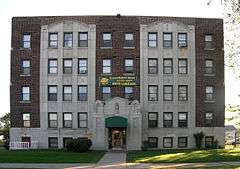 |
356 E. Grand Blvd. 42°21′13″N 83°0′21″W / 42.35361°N 83.00583°W |
|
| 9 | El Tovar Apartments | 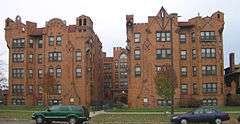 |
320 E. Grand Blvd. 42°21′12″N 83°0′20″W / 42.35333°N 83.00556°W |
|
| 8 | Kingston Arms Apartments | 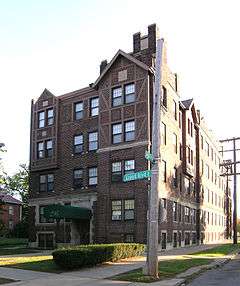 |
296 E. Grand Blvd. 42°21′16″N 83°0′28″W / 42.35444°N 83.00778°W |
|
| 10 | Belle Isle |  |
Detroit River, at the base of Grand Blvd. 42°20′32″N 82°58′46″W / 42.34222°N 82.97944°W |
Belle Isle is a 982-acre (3.97 km2) island park in the Detroit River, home to the Anna Scripps Whitcomb Conservatory, the Detroit Yacht Club, the Detroit Boat Club, the Dossin Great Lakes Museum, a Coast Guard post, and a municipal golf course. It is the largest island park in the United States. |
See also
References
- 1 2 3 East Grand Boulevard Historic District from Detroit1701.org
- ↑ "The Renaissance man who envisioned Grand Boulevard". The Detroit News. 11 May 2014. Retrieved 11 May 2014.
- 1 2 3 Richard Bak, Detroit Across Three Centuries, Sleeping Bear Press, 2001, ISBN 1-58536-001-5, p. 60.]
- ↑ East Grand Boulevard Historic District from the city of Detroit
- ↑ AIA-Detroit (2006-01-10). "Look Inside: Top 10 Detroit Interiors". Model D. Retrieved 2008-07-04.
